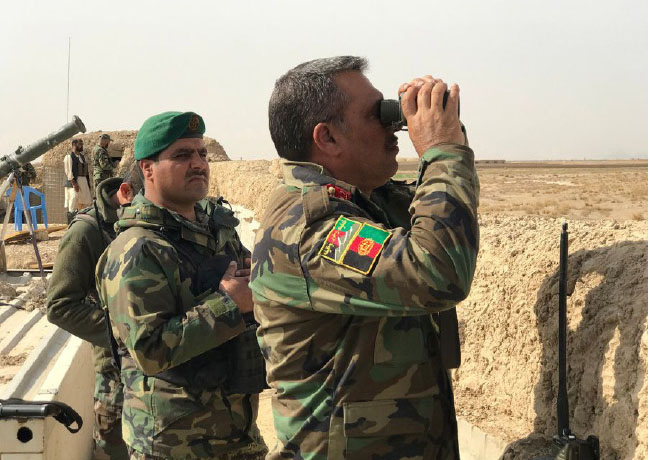BELANDI - A convoy of armored vehicles moved toward this mud-walled village in Farah province, gunners firing nonstop.
From a nearby command post, an Afghan army colonel trained his binoculars and called out enemy positions. Outside, soldiers and police officers milled impatiently in ankle-deep dust, waiting for orders to move in.
Taliban fighters had captured a village police post several weeks before. Now, about 250 Afghan soldiers and police were here to take it back.
"A hundred meters further," Col. Abdul Jalal Jalal yelled, after a 122-millimeter howitzer shell hit a mud compound and a cloud of smoke rose. Beside him, Gen. Fazel Ahmad Sherzad, the provincial police chief, was on his cellphone, listing coordinates for a possible U.S. airstrike.
Amid the deafening sounds of crossfire, a bomb planted in a cracked mud wall exploded. Two police officers fell back, slightly wounded, and were soon on their way to a hospital in Farah City, the provincial capital eight miles south.
For everyone else, the battle that mid-February morning was just beginning.
As the Taliban continue an aggressive campaign to control territory across Afghanistan - skipping their traditional winter fighting break while thousands of new U.S. forces arrive to train and strengthen the Afghan security forces - one of their more surprising and successful targets has been Farah province, a remote western region that shares a border with Iran.
The insurgents hold pieces of strategic border provinces such as Kunduz and Helmand but have failed to take permanent control of their capitals despite repeated attempts. Now they are turning to more far-flung, less well-defended provinces, including Farah and Badakhshan. An isolated farming region, Farah has less than 1 million inhabitants and is rarely visited by journalists.
The Taliban have been active in Farah for several years, but the current intense assault began two months ago. In January, they blocked highways to Farah City, seized large portions of neighboring Posht-e-Rod district and overran several security outposts, killing at least 43 policemen and wounding more than 50. Emboldened, they crossed the dried Farah Rud River, a natural barrier to the city, and attacked a suburban outpost.
The deputy provincial police chief, leading a reinforcement unit to defend the besieged men, was killed when a roadside bomb exploded near his Humvee. In other cases, outposts fell before help could arrive."The Taliban reached the city's gates," said Amir Mohammad Ayobi, an elder in the capital. "For a week or two, they overran police posts every night." He said local forces were not motivated to fight, and that robbery and theft surged in the capital as the conflict neared. Families fled to neighboring provinces amid the chaos, and angry protests broke out.
The official reaction was swift. The provincial governor resigned, and the police chief was fired. President Ashraf Ghani appointed replacements, and hundreds of reinforcements were sent to prevent the city from falling, including elite Afghan army commandos and U.S. and Italian advisory troops.
In the past several weeks, Afghan ground forces backed by airstrikes have fought to retake lost territory and reopen key roads. But the Taliban have long been entrenched in the province, operating freely in remote and unpoliced areas.
By some estimates, the insurgents now control 60 percent of Farah, while the government controls only the capital and 10 district centers, some of which are too dangerous for district officials to visit. Nationwide, the insurgents control at least 13 percent of the country's 407 districts and are contesting up to one-third.
Authorities in Farah refused to provide casualty statistics, but documents provided at a hospital showed that in the last 10 months, the bodies of 225 policemen, 52 soldiers and 39 civilians were sent there, along with 230 policemen and 52 soldiers treated for wounds.
Despite the heavy deployment of reinforcements, clashes continue in some districts. Farah City has largely returned to normal. Last week, during a visit by a Washington Post reporter, the streets were crowded and shops open. Army and police vehicles patrolled regularly, and attack helicopters circled periodically overhead.
Nighttime patrols were also visible, and late one evening the new governor's chief bodyguard, MaiwandAlozai, took a spin around the capital in his white Toyota Hilux truck, music blaring loudly from the speakers, and stopped to chat at police check posts and late-night groceries. (Stripes)
Home » Afghanistan » Taliban Wage Fierce Fight in Remote Western Afghanistan
Taliban Wage Fierce Fight in Remote Western Afghanistan

